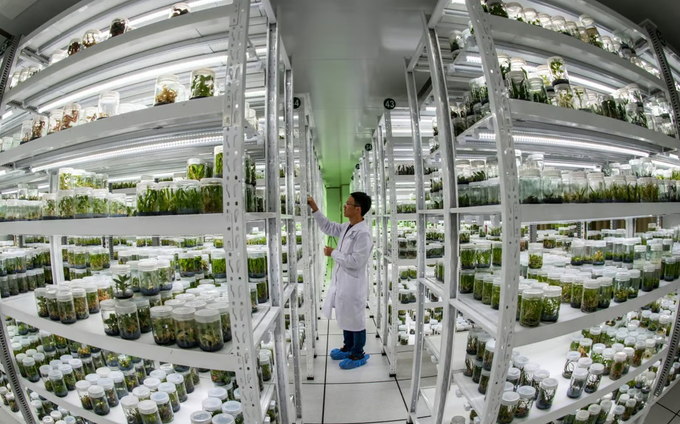November 27, 2025 | 09:17 GMT +7
November 27, 2025 | 09:17 GMT +7
Hotline: 0913.378.918
November 27, 2025 | 09:17 GMT +7
Hotline: 0913.378.918

China faces increasing pressure to feed its 1.4 billion people and mounting external uncertainty, says Xi Jinping. Photo: Xinhua
China’s seed industry lacks competitiveness in major vegetables such as corn and “seriously relies on imports” for most non-staple food, a group of officials from central China said in a recently published article.
“High-end vegetable seeds from overseas are sold by number, but home-grown vegetable seeds are sold by weight. The gap in their market value is huge,” officials from Hubei province’s seed administration wrote.
Dubbed the “chips of agriculture”, seeds bred in China are generally deemed of low quality and low efficiency, while the industry suffers from a lack of innovation and is losing its edge in the global market, said the article published last week in the country’s top agricultural journal, China Seed Industry.
China has vowed to boost support for seed breeding technologies to ensure food security amid worsening ties with the US – where most of its food and seed imports come from – and prepare for the increasing impact of climate change, urbanisation and shifting diets.
“The 1.4 billion people in our country were well fed in the past couple of years and we’ve held our bowls steadily in our own hands. Now, the demand for food is increasing, so is the pressure of holding the bowl,” President Xi Jinping said in the annual national rural work conference in December.
The country saw a deficit of 350 million yuan (US$50.9 million) in crop seed trade in 2021, mainly driven by the demand for vegetables, according to figures from the Ministry of Agriculture and Rural Affairs.
Considering seed technology and preserving farmland are the two top priorities for China’s food production, the central government issued a seed industry revitalisation plan in 2021 in the aim of having control of seed sources.
Despite the fact foreign breeders occupy just 3 per cent of China’s seed market, domestically produced seeds of corn and soybean are “more than 20 years behind” the United States in terms of yields, the Hubei officials said.
Yields of both crops are only about 60 per cent of those growing in the US, they said.
While a strong industry requires long-term commitment, many domestic seed companies are short-sighted and share a mentality of “being satisfied with small wealth”, they said.
In a move to consolidate the sector, the agriculture ministry last year picked 276 domestic breeders that would receive special government support in capital and talent.
At a meeting with representatives from these state-supported companies over the weekend, it said their innovation and competitiveness have been strengthened through increased investment and enhanced cooperation with research institutes and financial companies.
But Huo Xuexi, a professor of agricultural economics from Northwest A&F University, said China would need decades of time to get where the West is now in seed breeding.
“Revitalising the seed industry is a tall order,” he said, referring to China’s ambition to achieve self-reliance.
“First of all, we need at least 10 years to figure out basic scientific questions in agriculture, and then it will take another long period to bring basic research results to the market.”
(SCMP)

(VAN) A new study reveals how the simultaneous effects of ocean acidification, salinity and loss of oxygen are making the world more fragile.

(VAN) Hopes are growing that the creation of the first 3D turkey gut model could be a turning point in the battle against the virulent blackhead disease.

(VAN) Tyson, America’s biggest meat supplier, plans to shutter one of its largest beef processing plants as the industry continues to struggle with low cattle supplies and political pressure from Washington.

(VAN) New FAO study shows how digital solutions are empowering farmers and fishers to prevent losses and build resilient agrifood systems.

(VAN) Brazil's COP30 presidency pushed through a compromise climate deal on Saturday that would boost finance for poor nations coping with global warming but that omitted any mention of the fossil fuels driving it.

(VAN) Poultry farmers in the UK have been warned that they could face one of the worst winters yet for bird flu.

(VAN) Prices of main-crop paddy have risen sharply, with jasmine rice hitting 16,100 baht per tonne — the highest level in years.